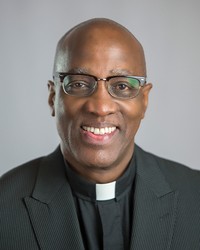The Reverend J. Herbert Nelson, II, Stated Clerk of the General Assembly of the Presbyterian Church (U.S.A.), has joined an interfaith amicus brief opposing the Trump Administration’s third executive order, which deals with restricting travel to the United States.
The brief—in the case of Trump v. State of Hawaii—was filed at the U.S. Supreme Court on March 30.
The case, originally filed in the Ninth Circuit by the State of Hawaii; Ismail Elshikh, Ph.D.; two John Doe individuals, and the Muslim Association of Hawaii, sought an injunction to stop the Federal government from implementing the third of the executive orders issued in 2017 restricting travel to the U.S. The court agreed with the plaintiffs and stopped the government from implementing its travel ban on October 20, 2017.
The third travel ban, which is the subject of the court’s ruling in this case, indefinitely suspended the entry of nationals from seven countries, and restricted certain types of visas for nationals from eight additional countries.
The Stated Clerk joined the amicus (“friend of the court”) brief, along with forty-four other groups. In the brief they stated they are “standing for the right of all believers to practice their religions, as guaranteed by the First Amendment.”
Christian, Muslim, Jewish, and Sikh communities were among those who signed, including the American Baptists Churches—USA, United Church of Christ, Unitarian Universalists, Leadership Conference of Women Religious, United Sikhs, Islamic Circle of North America, and the National Council of Jewish Women.
The PC(USA) Advisory Committee on Litigation reviewed the brief and the history of General Assembly policy on due process and immigration and advised the Stated Clerk to join as a friend of the court in the brief.
Nelson said: “Presbyterians have advocated for and been the hands and feet of refugee resettlement and immigrant welcome since World War II—not out of political correctness, rather, we know from whom we came. We are the children of a wandering Aramean and it was nothing less than the hand of God that guided us to the places we now call home.”
He continued: “God has shown us, for decades, our roles in carrying out that providence for the next generation of newcomers and so we strive now to protect the paths that will lead this generation and the ones who follow to their new home.”
In their amicus brief, the faith groups point out that the legislative branch—not the executive branch—has authority to make laws governing admission to the U.S. of those from other countries, dating back to the 1960s when such discriminatory laws as the Chinese Exclusion Act of 1893 and the Emergency Quota Act of 1921 (barring southern and eastern Europeans) were overturned.
Teresa Waggener, immigration attorney in the Office of Immigration Issues of the Office of the General Assembly, explained: “At the same time Congress was writing the Civil Rights Act and the Voting Rights Act, they were also changing the Immigration and Nationality Act (INA) to correct a history of race-based quotas in our immigration system. These crucial changes made in the 1960s changed the way our government applied its immigration laws and policies. Discrimination based on nationality became prohibited under law.”
The amicus brief questions the president’s power to indefinitely exclude entire nations of people given the explicit prohibition against discrimination based on nationality that is now a part of the INA. The brief states: “This long-overdue [INA] measure was also supported by a number of faith groups that recognized the fundamental injustice of nationality-based exclusions and restrictions.
The brief filers also ask the Supreme Court to consider the intent of the executive order, which they believe targets those of Islamic faith. The brief points to a history of statements made by President Trump as a candidate and after entering office about his intent to impose a “Muslim ban” and conflating Muslim immigrants with “foreign terrorists.”
The race and faith biases present in all four versions of the executive orders on travel “are precisely what Presbyterians, at the General Assembly, have prayed to end for 125 years,” said Amanda Craft, manager of advocacy in the Office of Immigration Issues
“In 1893, our General Assembly opposed the Chinese Exclusion Act. In 1990, we pledged to ‘combat vigorously any expression of racism either in policies or implementation’ in our immigration system and in 2008 the General Assembly encouraged congregations to advocate for a haven for Iraqi refugees, ‘regardless of the religious faith,’” she said.
The Supreme Court will hear oral argument in this case on Wednesday, April 25, 2018.
To become a part of the PC(USA)’s efforts to welcome and support immigrants, go to: #WeChooseWelcome.
[한국어]

